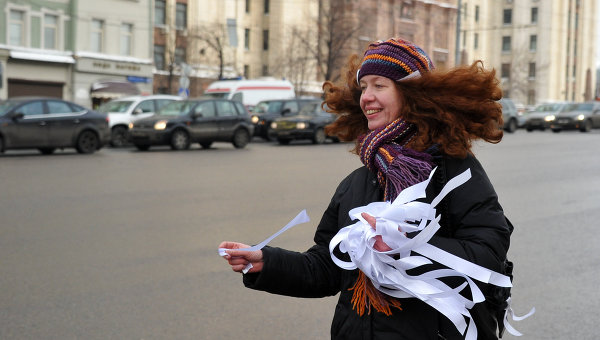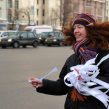
Russia Passes Draconian Anti-Protest Law after First Filibuster in Duma’s Modern History
Publication: Eurasia Daily Monitor Volume: 9 Issue: 109
By:

June 5, 2012 will likely go down in history as the turning point in the development of Russian parliamentarism. Under Vladimir Putin and Dmitry Medvedev, the Russian State Duma (lower chamber of Parliament) has been a rubber-stamp body in which the United Russia Party and the Kremlin have easily passed their proposed legislation. But on June 5, the well-oiled law-making machine suddenly broke down.
The cause of the breakdown was a draft law that would add much harsher punishments for participating in rallies and demonstrations to the Code of Administrative Violations. Proposed by United Russia, it was strongly opposed by all the other parties represented in the Duma: the Communists, Vladimir Zhirinovsky’s nationalist party, and A Just Russia Party. A Just Russia deputies organized the first filibuster in the modern history of the Russian parliament.
The deputies from A Just Russia wrote up 359 amendments, and the Communist deputies proposed another batch of about 150 amendments. According to Duma procedure rules, each amendment has to be voted on separately. As a result, the hearing went on for 11 hours even though the speaker, Sergei Naryshkin, limited each amendment discussion to one minute (instead of three minutes stipulated in the rules), and then cut it further to 30 seconds. Toward evening, when there was a real likelihood that the Duma would not vote on the legislation that day, Naryshkin limited discussion and voting to a paltry 15 seconds (https://www.gazeta.ru/politics/2012/06/06_a_4615049.shtml).
Naryshkin’s cavalier disregard for parliamentary procedure paid off in the end. A few minutes before midnight, the United Russia majority passed the draft law.
The unprecedented opposition to the draft law was for good reason. “This law is hell. Welcome to North Korea,” Dmitry Gudkov, a deputy from A Just Russia, wrote on his blog (https://dgudkov.livejournal.com/183072.html).
Former Finance Minister Alexei Kudrin also offered an unflattering commentary on the law, calling it a “crude violation of a number of principles of rule of law and, consequently, a violation of the constitutional right of citizens to peaceful assembly” (https://akudrin.ru/news/zakonoproekt-o-shtrafakh-za-mitingi-popiraet-svobodu-mirnykh-sobraniy.html).
The legal analysis of the law carried out by Mikhail Fedotov, Chairman of the Presidential Council on the Development of Civil Society and Human Rights, was also negative (https://www.president-sovet.ru/structure/group_3/materials/zaklyucheniya_ekspertov_nezavisimogo_ekspertno_pravovogo_soveta/zaklyuchenie_na_proekt_federalnogo_zakona_70631.php).
Indeed, any professional legal specialist would be taken aback by the legislation. The text does not even define its basic terms. The draft law prohibits the vague “organization of mass simultaneous gatherings and/or movement of citizens in public places.” Such a broad definition could apply to any group of people walking on the street, from wedding parties taking photographs at picturesque spots to groups of schoolchildren going to a museum. If these “simultaneous movements” hamper pedestrians, the “movers” will face a fine of 20,000 rubles ($610) – in contrast to the 2,000-ruble fine for similar acts in the old legislation.
Increased fines give the new law a real wallop. The maximum fines for various violations of the “simultaneous gatherings or movements” are now 150-fold higher: from 2,000 to 300,000 rubles ($9,100). In a Russia, the average annual salary is a bit over $20,000.
But the law does not stop there. It introduces a new form of punishment for administrative offences – compulsory work. Until now, this has only been imposed for some felony violations. In Fedotov’s letter to Speaker Naryshkin, he pointed to the legal absurdity introduced by the law – punishment for administrative violations becoming more severe than for some categories of felonies (https://www.echo.msk.ru/doc/895712-echo.html).
Despite its obvious legal faults and broad-based opposition, after its shaky start in the Duma, the law flew through the state offices at the speed of light. By the next morning, it was already in the upper chamber of Parliament, the Federation Council, where it was ratified in 20 minutes with no discussion. And most of those 20 minutes were spent on a squabble between Speaker Valentina Matvienko and Senator Liudmila Narusova, the widow of former St. Petersburg mayor Anatoly Sobchak and mother of high-profile activist Ksenia Sobchak. Narusova fought for a discussion of the law, and when she failed she staged a walk-out. The law was passed with only one abstention. Today, on June 8, Russian President Putin officially signed the bill into law, and the text of it will be published tomorrow (Rossiiskaya Gazeta, June 8).
Why did the Kremlin ram this law through so quickly? The answer is simple: A large opposition march is scheduled for June 12 – the national Russia Day holiday. The march has not yet been sanctioned by the authorities but is likely to go on regardless, which will inevitably lead to clashes and arrests.
However, there is still another important question: How effective will the law be in the battle against opposition protests?
Ilya Yashin, one of the opposition leaders, wrote in an article in the New Times magazine that intensified repression would not bring results. “Smart authorities do not fight against protests. They fight against the source of the protests. But stupid authorities anger already disgruntled citizens with repressive laws” (https://newtimes.ru/articles/detail/53098/).
Yashin may be too optimistic. The new draft law is essentially a copy of the laws introduced by President Alexander Lukashenko in Belarus at the end of 2010 during a wave of mass protests in the capital of Minsk (see EDM June 7). Using these laws combined with the persecution of the opposition leaders, Lukashenko was able to stabilize the situation.
On the other hand, it is not wise to compare such different countries. The protest mood in Moscow is raging. On just one day, June 5, the police detained 70 people for protesting the draft law, breaking the arm of one of the activists. In this heated atmosphere, even short-term predictions may go awry.




